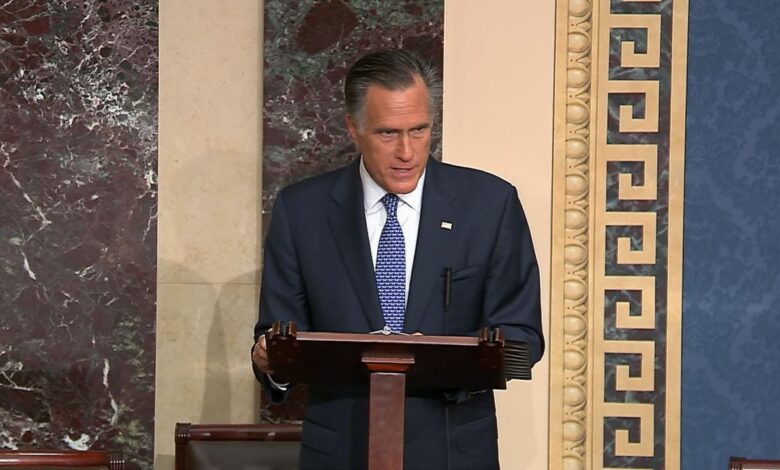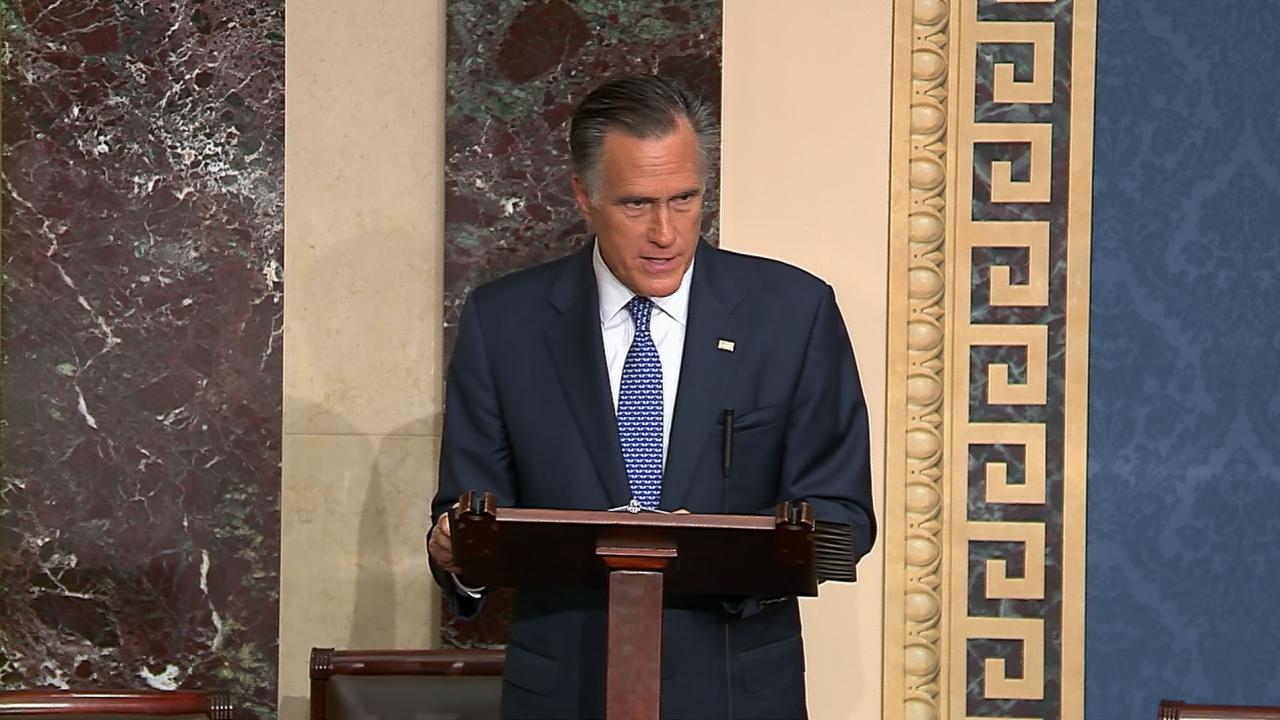
Romney Votes to Convict Trump in Impeachment Trial
Romney announces he will vote to convict Trump in impeachment trial, a decision that has sent shockwaves through American politics. This move, a stark contrast to the majority of his Republican colleagues, has thrust Romney into the spotlight, making him a focal point of intense scrutiny and debate.
The decision comes at a pivotal moment in American history, with the nation deeply divided and the future of democracy hanging in the balance. This blog post delves into the intricacies of Romney’s decision, exploring its context, rationale, and potential implications for the future of the country.
The impeachment trial, stemming from Trump’s alleged role in inciting the January 6th Capitol riot, has been a highly charged event, dividing the nation along partisan lines. Romney’s decision to break ranks with his party, citing the gravity of the charges against Trump and the need to uphold the Constitution, has sparked a fierce debate about the role of conscience in politics.
The consequences of his vote, both immediate and long-term, are still being analyzed, with experts weighing in on its potential impact on the Republican party, the 2024 presidential election, and the future of American democracy itself.
Romney’s Decision and its Context
Senator Mitt Romney’s vote to convict former President Donald Trump in the second impeachment trial marked a significant moment in American politics. This decision, made in February 2021, came after a turbulent period of political turmoil, following the January 6th attack on the U.S.
Capitol.
The Impeachment Trial and the Charges Against Trump
The impeachment trial stemmed from Trump’s actions leading up to and during the attack on the Capitol. The House of Representatives impeached Trump on January 13th, 2021, on a single charge of “incitement of insurrection.” The impeachment proceedings focused on Trump’s speech to his supporters on January 6th, where he urged them to march to the Capitol and “fight like hell” to overturn the election results.
The House impeachment managers argued that Trump’s words directly incited the violence that followed, and that he had abused his power by spreading false claims of election fraud and pressuring state officials to overturn the results. Trump’s defense team argued that his speech was protected by the First Amendment and that he did not intend to incite violence.
Romney’s Prior Stances on Trump and his Administration
Romney, a Republican senator from Utah, has been a vocal critic of Trump throughout his presidency. He was the only Republican senator to vote to convict Trump in his first impeachment trial in 2019, which stemmed from allegations of Trump’s pressure on Ukraine to investigate his political rival, Joe Biden.Romney has frequently expressed his disapproval of Trump’s rhetoric and policies, particularly his handling of the COVID-19 pandemic and his divisive language.
However, Romney has also supported some of Trump’s policies, such as his tax cuts and his appointment of conservative judges.
The Political Climate and Potential Consequences of Romney’s Vote
Romney’s decision to vote to convict Trump was met with a mixed reaction from both sides of the political aisle. Some praised him for his courage and principled stand, while others criticized him for betraying his party and contributing to further political polarization.
The political climate in the United States was highly charged at the time of the impeachment trial, with deep divisions between Republicans and Democrats. Romney’s vote was seen by some as a sign of the growing rift within the Republican Party, with a growing number of Republicans expressing dissatisfaction with Trump’s leadership.The potential consequences of Romney’s vote are still being debated.
Some argue that it could lead to a more divided Republican Party, while others believe it could be a catalyst for a more moderate and inclusive approach to politics.
Romney’s Rationale: Romney Announces He Will Vote To Convict Trump In Impeachment Trial
Romney’s decision to vote to convict Trump was a significant moment in the impeachment trial, particularly given his history as a Republican and his previous support for Trump. His rationale for this decision was rooted in a combination of legal and moral arguments, and he presented these arguments with a clear and concise voice.
Romney’s Stated Reasons
Romney Artikeld his reasoning for voting to convict in a detailed statement released shortly after the trial. He argued that Trump’s actions in inciting the January 6th Capitol riot constituted an abuse of power and a violation of the Constitution.
He specifically cited Trump’s words at the rally preceding the riot, where he urged his supporters to “fight like hell” and “take back our country,” as evidence of his intent to incite violence. Romney also pointed to Trump’s failure to act swiftly to quell the violence once it began, arguing that this demonstrated a lack of responsibility and a willingness to let the situation escalate.
Analysis of Romney’s Arguments
Romney’s arguments were grounded in a strong understanding of the Constitution and the principles of American democracy. He emphasized the importance of holding elected officials accountable for their actions, particularly when those actions threaten the integrity of the democratic process.
His focus on Trump’s words and his inaction during the riot highlighted the gravity of the situation and the potential consequences for the future of American democracy.
Comparison to Other Senators’ Positions
Romney’s position on the impeachment trial differed significantly from that of most other Republican senators. While many Republicans argued that the trial was unconstitutional or that Trump’s actions did not warrant conviction, Romney focused on the specific actions taken by Trump and the potential impact on American democracy.
His willingness to stand apart from the majority of his party demonstrated his commitment to his principles and his belief in the importance of upholding the Constitution.
Impact and Reactions
Romney’s vote to convict Donald Trump in the impeachment trial sent shockwaves through the political landscape, drawing immediate reactions from both sides of the aisle and sparking debate about the long-term implications for American politics.The vote, which came after a lengthy and emotionally charged trial, marked a significant moment in American history.
It was the first time in over a century that a senator had voted to convict a president of their own party. Romney’s decision, therefore, had immediate and far-reaching consequences, both politically and personally.
Immediate Reactions
The immediate reactions to Romney’s vote were sharply divided along partisan lines. Republicans, with a few exceptions, were quick to condemn Romney’s decision, accusing him of betraying the party and siding with the Democrats. Many Republican lawmakers and commentators denounced Romney’s vote as a political stunt, arguing that it was motivated by personal ambition rather than principle.
Some even called for Romney’s expulsion from the Republican Party. On the other hand, Democrats praised Romney’s vote, hailing it as a courageous act of principle and a rebuke to Trump’s actions. Many Democratic lawmakers and commentators lauded Romney for standing up to Trump and upholding the Constitution, even at the cost of his own political standing.
Potential Long-Term Consequences
The long-term consequences of Romney’s vote remain to be seen, but they could be significant. Some argue that Romney’s decision could further exacerbate the already deep partisan divide in American politics, potentially leading to more polarization and gridlock in Washington.
It’s interesting to see how Romney’s vote to convict Trump in the impeachment trial reflects a growing sense of accountability within the Republican party. Meanwhile, tv stations taking down inflammatory GOP ads about North Carolina’s Democratic senate candidate Cheri Beasley due to inaccuracies highlights the importance of truth and transparency in political campaigns.
Ultimately, both situations demonstrate a push for a more responsible and ethical approach to politics, which is encouraging to see.
Others believe that Romney’s vote could serve as a catalyst for a broader movement within the Republican Party to hold Trump accountable for his actions. The potential consequences of Romney’s vote will also depend on the reactions of the American public.
If voters are persuaded by Romney’s argument that Trump’s actions warranted impeachment, it could lead to a shift in public opinion and increase pressure on Republican lawmakers to distance themselves from Trump. However, if voters are not persuaded by Romney’s argument, it could lead to a backlash against him and other Republicans who have criticized Trump.
Implications for Romney’s Political Future
Romney’s decision to vote to convict Trump has undoubtedly had an impact on his own political future. While some believe that Romney’s vote could enhance his standing among moderate voters and potentially help him win re-election in 2024, others believe that it could alienate him from the Republican base and make it difficult for him to win another term.Romney’s decision to vote to convict Trump is a significant moment in American politics.
The immediate reactions were sharply divided, and the long-term consequences remain to be seen. However, it is clear that Romney’s vote has already had a significant impact on the political landscape, and it will likely continue to be a topic of debate for years to come.
Historical Perspective
Romney’s vote to convict Trump in the impeachment trial was a significant moment in American history. It was the first time a senator from the same party as the president voted to convict in an impeachment trial since 1868, when seven Republican senators voted to convict Andrew Johnson.
Romney’s vote to convict Trump in the impeachment trial highlights the growing divide within the Republican party. This division is further emphasized by the recent statement made by a GOP congressional candidate who believes that abortion is a human sacrifice to demons, as reported here.
While Romney’s vote represents a break from the party’s current leadership, this candidate’s stance represents an even more extreme and worrying shift in the Republican platform. This divergence of opinions within the GOP raises serious questions about the party’s future direction and its ability to appeal to a broader range of voters.
This historical context provides valuable insights into the unique circumstances surrounding this impeachment trial and the potential long-term impact on the US political system.
Comparison of Impeachment Trials
The following table compares the impeachment trial of Donald Trump to previous impeachment trials in American history:
| Impeachment Trial | President | Charges | Outcome | Date |
|---|---|---|---|---|
| First Impeachment Trial | Andrew Johnson | High crimes and misdemeanors, specifically violating the Tenure of Office Act | Acquitted by one vote in the Senate | 1868 |
| Second Impeachment Trial | Bill Clinton | Perjury and obstruction of justice, related to a sexual harassment lawsuit | Acquitted by the Senate | 1999 |
| Third Impeachment Trial | Donald Trump | Incitement of insurrection, related to the January 6th attack on the Capitol | Acquitted by the Senate | 2021 |
Political Landscape and Role of Senators
The political landscape and the role of senators in impeachment trials have evolved over time. This table highlights key differences in the political landscape and the role of senators:
| Factor | 1868 (Johnson) | 1999 (Clinton) | 2021 (Trump) |
|---|---|---|---|
| Political Polarization | High, due to the aftermath of the Civil War | Moderate, with a focus on bipartisanship | Extremely high, with a partisan divide |
| Role of Senators | Viewed as jurors and judges, with a focus on upholding the Constitution | Viewed as political actors, with a focus on party loyalty | Viewed as partisan warriors, with a focus on winning at all costs |
| Public Opinion | Highly divided, with strong opinions on both sides | More divided, with strong opinions on both sides | Extremely divided, with strong opinions on both sides |
Long-Term Impact on US Political System, Romney announces he will vote to convict trump in impeachment trial
The impeachment trial of Donald Trump has the potential to have a long-term impact on the US political system. This table illustrates some potential long-term impacts:
| Potential Impact | Description |
|---|---|
| Increased Political Polarization | The impeachment trial could further exacerbate the already deep political divide in the United States, making it more difficult to find common ground and compromise on important issues. |
| Erosion of Trust in Institutions | The impeachment trial could erode public trust in government institutions, particularly the Congress and the judiciary. |
| Changes in Impeachment Process | The impeachment trial could lead to changes in the impeachment process, such as stricter rules for evidence and testimony. |
Public Opinion

Public opinion surrounding the impeachment trial and Romney’s vote was complex and polarized. The trial itself divided the nation, with Republicans largely supporting President Trump and Democrats largely supporting his impeachment. Romney’s vote to convict, therefore, was seen as a significant break from the partisan divide.
Public Opinion Polls
Public opinion polls conducted during the impeachment trial reflected the deep partisan divisions. A Gallup poll conducted in January 2020 found that 80% of Republicans opposed Trump’s impeachment, while 90% of Democrats supported it. This stark divide persisted throughout the trial.
For example, a Pew Research Center poll conducted in February 2020 found that 72% of Republicans believed Trump should not be removed from office, while only 24% of Democrats agreed.
Public Sentiment and Romney’s Decision
While Romney’s vote was widely seen as a courageous act, it’s unclear to what extent public sentiment influenced his decision. Some analysts argued that Romney’s vote was a reflection of his personal convictions and a desire to uphold the Constitution, rather than a response to public pressure.
Others suggested that Romney may have been swayed by the growing public support for impeachment, even among some Republicans.
Influence of Public Opinion on Future Political Events
Public opinion plays a significant role in shaping political events. The outcome of elections, the passage of legislation, and the appointment of judges are all influenced by public sentiment. In the context of Romney’s vote, it’s possible that his decision could influence future political events in several ways.
For instance, it could encourage other Republicans to break with their party on issues of conscience, or it could embolden Democrats to pursue more aggressive impeachment efforts in the future.
Romney’s vote to convict Trump in the impeachment trial was a significant moment, highlighting the deep divisions within the Republican party. It’s interesting to see how this contrasts with the recent news that another California board diversity law was struck down , despite its positive impact.
While the focus is on political divides, it’s crucial to remember that societal progress often happens through smaller, incremental changes, even when faced with setbacks.
It’s also possible that Romney’s vote could contribute to a growing sense of political polarization, as Republicans and Democrats become further entrenched in their respective positions.
Implications for the Future
Romney’s vote to convict Trump in the impeachment trial was a significant moment in American politics, and its implications for the future are still being debated. This event could reshape the Republican party and the American political landscape in the coming years.
Potential Impact on the 2024 Presidential Election
Romney’s vote could have a significant impact on the 2024 presidential election. The Republican party is currently deeply divided, and Romney’s vote could further exacerbate these divisions. Some Republicans may be more likely to support a candidate who aligns with Trump’s views, while others may be more likely to support a candidate who is more moderate.
This could lead to a more competitive Republican primary, which could ultimately benefit the Democratic nominee.
Influence on the Future of the Republican Party
Romney’s vote could also influence the future of the Republican party. The party is already grappling with how to balance the demands of its Trump-supporting base with the need to appeal to moderate voters. Romney’s vote could lead to a further shift in the party’s direction, potentially making it more difficult for Republicans to appeal to moderate voters.
However, it could also embolden those who are seeking to reform the party and move it away from Trump’s influence.
Long-Term Consequences for the American Political Landscape
Romney’s vote could also have long-term consequences for the American political landscape. The impeachment trial has exposed deep divisions within the Republican party, and Romney’s vote has further highlighted these divisions. This could lead to a more polarized political climate, making it more difficult to find common ground on issues that affect the country.
However, it could also lead to a more active and engaged electorate, as people become more aware of the importance of their vote.
Closing Summary
Romney’s decision to vote to convict Trump in the impeachment trial is a significant event with far-reaching implications. It serves as a stark reminder of the importance of individual conscience and the potential for political courage in the face of intense pressure.
While the immediate impact of this vote remains to be fully realized, it is clear that this decision has shifted the political landscape and set the stage for a potentially transformative period in American history. As we move forward, the echoes of Romney’s vote will undoubtedly resonate in the halls of Congress, the public sphere, and the hearts and minds of Americans across the nation.






